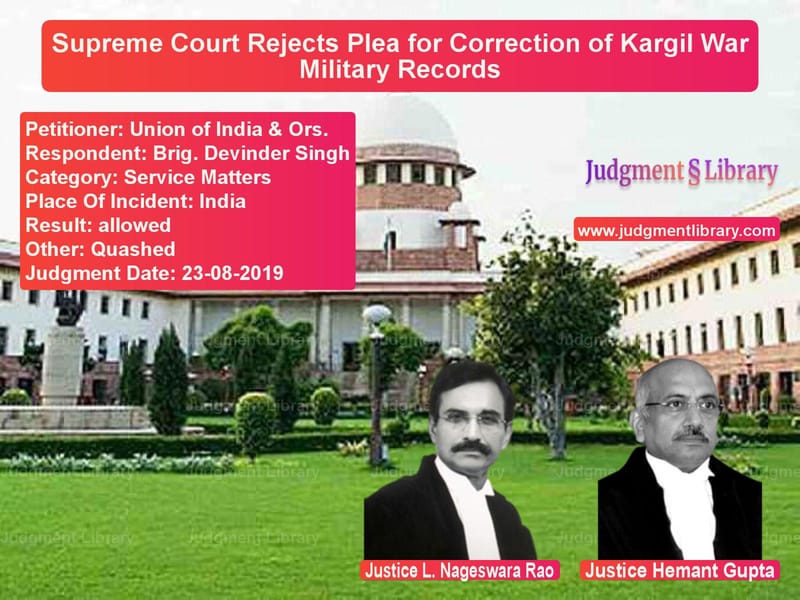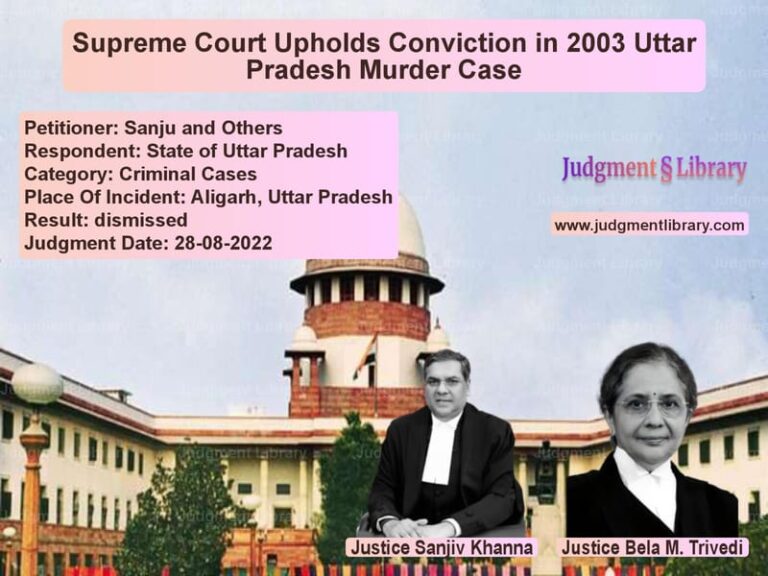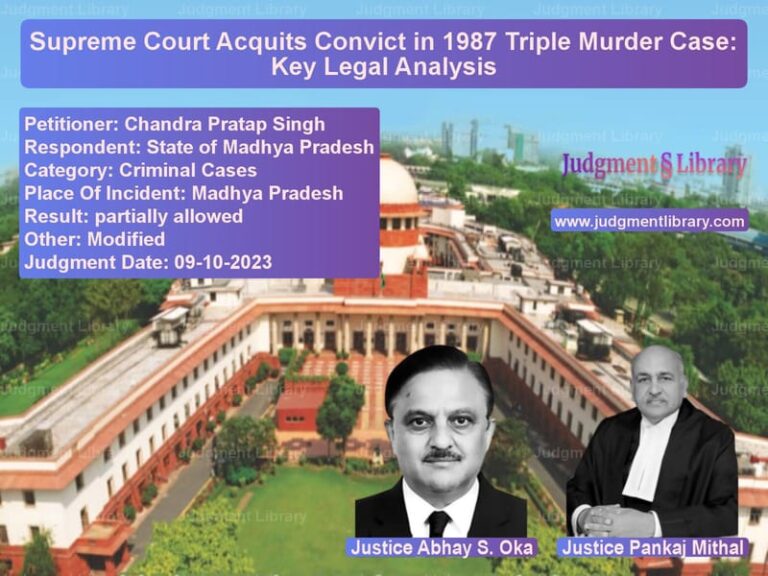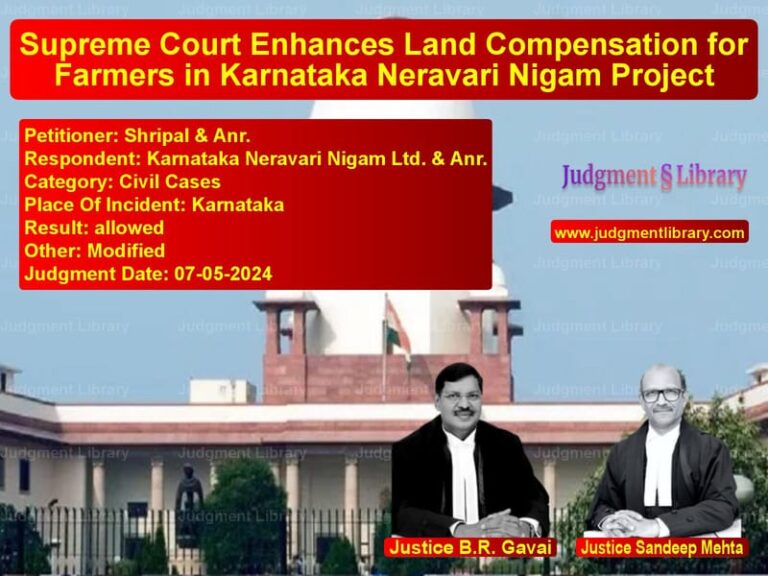Supreme Court Rejects Plea for Correction of Kargil War Military Records
The Supreme Court of India, in a landmark judgment on August 23, 2019, ruled against a plea seeking correction of military records related to the Kargil War. The case, Union of India & Ors. v. Brig. Devinder Singh, revolved around allegations that official reports downplayed the contributions of the respondent, Brig. Devinder Singh, during Operation Vijay. The officer had approached the Armed Forces Tribunal (AFT) seeking a directive to amend official reports, including the After-Action Report (AAR), Battle Performance Report, and reports prepared by the Army Headquarters.
The Supreme Court ruled that judicial review cannot extend to modifying internal military reports, which are meant for strategic and historical reference. The Court emphasized that such reports serve national security interests and are not intended to adjudicate personal claims or recognition.
Background of the Case
Brig. Devinder Singh was promoted to the rank of Brigadier in May 1998 and commanded the 70 Infantry Brigade, which was actively engaged in counter-insurgency operations during the Kargil conflict of 1999. He claimed that his assessments and intelligence predictions regarding enemy movement were ignored, leading to initial setbacks in the conflict.
The officer further contended that the After-Action Report and other military reports misrepresented his contributions, attributing success in his sector to another officer. He sought judicial intervention to rectify these records and ensure that the correct facts were reflected in military archives.
The Armed Forces Tribunal, in an order dated May 17, 2010, partially ruled in favor of Brig. Devinder Singh. It directed the authorities to correct the relevant reports to accurately reflect his role. The Union of India challenged this decision before the Supreme Court, arguing that such reports are confidential and beyond judicial review.
Petitioner’s Arguments (Union of India)
The Union of India, representing the Indian Army, put forth the following arguments:
- Military Reports Are Strategic Documents: The Army maintained that After-Action Reports and similar documents are compiled for historical and strategic studies, not for career evaluations.
- Confidentiality of Reports: The government argued that these reports contain sensitive military intelligence and should not be altered through judicial intervention.
- Recognition Already Given: The Army highlighted that Brig. Devinder Singh had been awarded the Vishisht Seva Medal (VSM) for his role in Operation Vijay, acknowledging his contributions.
- Judicial Review Cannot Extend to Military Strategy: The Army asserted that courts lack the expertise to reassess battlefield decisions and operational reports.
Respondent’s Arguments (Brig. Devinder Singh)
Brig. Devinder Singh countered the Army’s arguments, stating:
- Incorrect Attribution of Credit: He alleged that the reports credited another officer, Brig. Ashok Dugal, for leading operations in his sector, despite evidence to the contrary.
- Denial of Due Recognition: The respondent maintained that his intelligence reports had accurately predicted enemy movements, which were initially dismissed.
- Judicial Oversight Needed: He argued that military records must reflect the truth, and judicial intervention was necessary to prevent historical inaccuracies.
Supreme Court’s Observations
The Supreme Court thoroughly analyzed the case and made several key observations:
1. Military Reports Are Not Subject to Judicial Review
The Court ruled that After-Action Reports and other battlefield reports are compiled for military strategy and research. It emphasized:
“The reports do not have any civil consequences and are not subject to judicial review by the Tribunal or the Courts.”
2. Reports Are Compiled for Strategic and Historical Purposes
The judgment highlighted that these reports are created based on multiple sources and compiled by superior officers for future strategic use. The Court observed:
“This Court neither has the expertise nor the jurisdiction to sit over the reports furnished by the Officers in respect of credit to the Officers involved in Operation Vijay.”
3. Judicial Review Cannot Change Historical Facts
The Court stressed that military decisions and reporting structures are part of the armed forces’ internal mechanisms. It noted:
“The Tribunal or the Court is not the authority to appreciate the historical facts; it is for the experts and Officers in the Armed Forces to record such facts.”
4. Recognition Has Already Been Given
The Supreme Court pointed out that Brig. Devinder Singh had already been honored with the Vishisht Seva Medal, indicating that his contributions were recognized.
5. No Adverse Consequences on Career
The Court found no evidence that the reports had negatively impacted the respondent’s career, noting that he had been promoted and awarded.
Final Verdict
The Supreme Court allowed the appeal by the Union of India and set aside the Armed Forces Tribunal’s directive to correct military reports. The ruling reaffirmed that courts cannot interfere with internal military documents intended for strategic and historical reference.
Impact of the Judgment
This judgment is significant for multiple reasons:
- Preservation of Military Confidentiality: It ensures that battlefield reports remain confidential and free from legal disputes.
- Judicial Limitations in Military Affairs: The ruling establishes that courts cannot rewrite military history or operational reports.
- Reaffirmation of Internal Military Review: The judgment highlights that recognition and promotions within the armed forces are governed by internal mechanisms, not judicial orders.
Conclusion
The Supreme Court’s decision in Union of India v. Brig. Devinder Singh marks a crucial precedent in military legal disputes. It ensures that military records remain authoritative and are not subject to judicial rewriting based on individual grievances. The ruling reinforces the principle that the judiciary should refrain from intervening in internal military affairs unless fundamental rights or civil consequences are involved.
By setting aside the Armed Forces Tribunal’s order, the Supreme Court has upheld the autonomy of the armed forces in documenting and preserving strategic information without external interference. This judgment serves as a guiding principle for future disputes involving military records and operational reports.
Petitioner Name: Union of India & Ors..Respondent Name: Brig. Devinder Singh.Judgment By: Justice L. Nageswara Rao, Justice Hemant Gupta.Place Of Incident: India.Judgment Date: 23-08-2019.
Don’t miss out on the full details! Download the complete judgment in PDF format below and gain valuable insights instantly!
Download Judgment: Union of India & Ors vs Brig. Devinder Singh Supreme Court of India Judgment Dated 23-08-2019.pdf
Direct Downlaod Judgment: Direct downlaod this Judgment
See all petitions in Public Sector Employees
See all petitions in Disciplinary Proceedings
See all petitions in Promotion Cases
See all petitions in Judgment by L. Nageswara Rao
See all petitions in Judgment by Hemant Gupta
See all petitions in allowed
See all petitions in Quashed
See all petitions in supreme court of India judgments August 2019
See all petitions in 2019 judgments
See all posts in Service Matters Category
See all allowed petitions in Service Matters Category
See all Dismissed petitions in Service Matters Category
See all partially allowed petitions in Service Matters Category







